Next month marks the 70th anniversary of Britain's darkest hour - the Blitz.
In August 1940, after much of Europe had been conquered by the Nazis and the British Empire stood alone against them, the Luftwaffe launched its devastating bombing campaign against British cities. From 24th August 1940 British cities were bombarded in a devastating wave of attacks. These attacks didn't last for several days or even several weeks - it wasn't until May 1941 that the bombings stopped. It wasn't just London that was hit. Almost every major town and city was. Birmingham, Manchester, Bolton, Coventry, Newcastle, Sunderland, Nottingham, Portsmouth, Cardiff, Swansea, Glasgow, Edinburgh, Belfast and more. London was so badly hit - it suffered 57 consecutive nights of bombing, leading to terror that can barely be conceived of today - that huge swathes of if were set ablaze, leading to the catastrophe being dubbed the Second Great Fire of London. By the end of the campaign Britain's cities were lying in ruins, around 43,000 civilians had been killed and 51,000 injured.
It took years for the cities to be rebuilt - many adults today who grew up in the 1950s can remember playing in bombed out buildings - and many buildings throughout the country still bear the scars of that devastating attack to this day.
At the start of the bombings, thousands of children (including my own grandparents) were evacuated from the towns and cities to live with strangers in the relatively safer countryside. Many went to live on farms. Many evacuees were also cruelly treated by their hosts. Many also told how, during the Blitz, they could see the night sky glowing orange in the distance as a city burned.
Hitler thought that such a campaign would eventually cause Britain to surrender and allow Germany to conquer it - but the British stood firm.
To mark the 70th anniversary of the start of the Blitz, these previously unpublished diaries, letters and memoirs, ordinary people describe what life was like during the Blitz.
Letters from the Blitz: Memoirs from the war's darkest days
By Carol Harris
17th July 2010
Daily Mail

Scars of war: Bomb damage from the Blitz is still visible to this day on buildings throughout the nation, such as that on the Victoria & Albert Museum in London (above)
Next month, it’s 70 years since the first German bombs of the Second World War fell on London. From 24 August 1940 Britain’s cities endured a long and terrible campaign of bombing that destroyed large parts of the country, killed thousands and left hundreds of thousands homeless. In this exclusive extract from previously unpublished diaries, letters and memoirs, ordinary people describe what life was like during the Blitz.
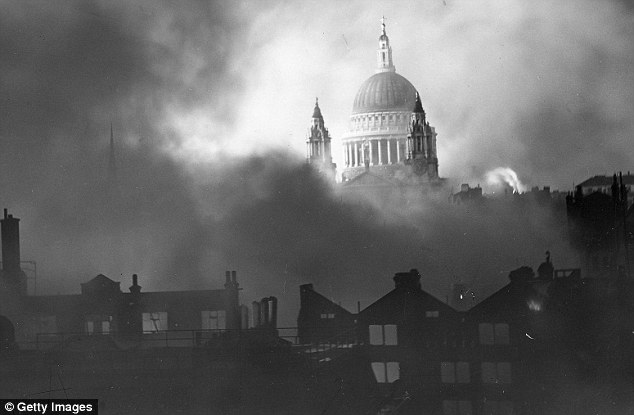
The Second Great Fire of London: St Paul's Cathedral remains standing as London burns all around
In London, attacks were concentrated on the City and the East End, the River Thames providing a shiny silver path for the bombers to follow to the docks. London suffered 57 consecutive nights of bombing from 7 September on, and during November had just one night’s respite, when bad weather prevented the Luftwaffe from coming.
This letter from Will, an ARP (Air-Raid Precautions) warden and schoolteacher in Leytonstone, East London to his brother in Wales describes the first weeks of the Blitz.
18 September 1940
I can’t possibly tell you of the number of bombs which have fallen, say, within one mile of this house. Stratford, Bow and Plaistow are terribly smashed up. Bombs fell on a number of shops in Leytonstone High Road and smashed four of them to mere rubble. Last Saturday night was the worst. An aerial torpedo landed directly on houses in Forest Drive West. Five were blown to pieces – not a stick of furniture could be seen – only piles of earth, bricks and beams of timber. Eleven bodies have been recovered and they think there are more to be found. Forty houses have been rendered uninhabitable and scores more in the street behind have had windows, doors, etc, destroyed.
I must confess that the long weary hours of waiting and listening through the night, quite alone in the house with not a soul to talk to, are very trying, but I am profoundly glad that Rube and the kiddies are away. This is no place for women and children.
Many folk have packed up and left here recently and I don’t blame them. Nearly all the main-line and suburban stations are closed. However, the biggest nuisance is the inability to shop, get a bath, haircut or go to church without being disturbed by the raids.
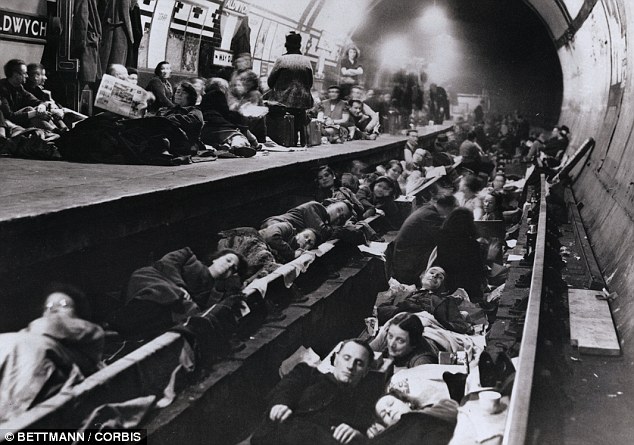
Tube stations were used as bomb shelters
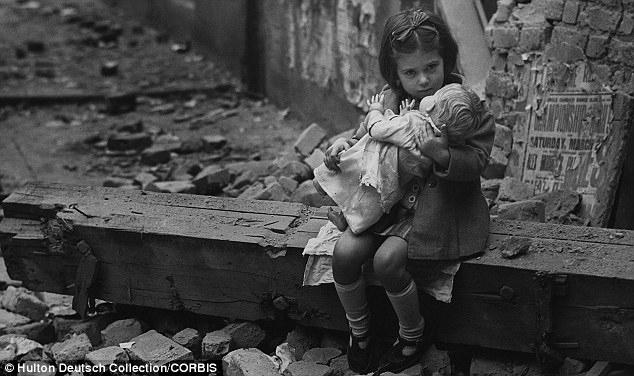
A young girl clutches her doll while sitting amid the rubble of her bombed-out home
Elizabeth Belsey was living in the family home in Keston, Kent, while her husband, Lieutenant John Belsey, served with the Royal Artillery at Thames Ditton in Surrey. Here is an exchange of letters between them.
Sunday 8 September 1940
My darling girl,
It was terrible last night. We were up for nine hours and the sky was lit by the most lurid glow from the tremendous fires in London. I watched the flames and the planes and the guns and I thought of you and had a terrible feeling that you were in danger.
Please, my darling, do not get hurt. Please keep alive for me to come back to you, to love you and look after you and see my beautiful baby again. I am now living without sleep and I suppose you are too, and that is much worse. A peaceful night now seems too remote to be considered.
All my love, John
My darling boy,
You must not worry about me, sweetheart. We are all right. We had four warnings yesterday, but heard nothing. It is dreadful to think of what is happening in London.
You too must take care of yourself for me and our precious baby for I do not know how I could endure your loss. I pray that all or none of us survives this war.
With all my love, Elizabeth
From November 1940, the Luftwaffe extended its bombing campaign to industrial towns, cities and ports around the UK. Margaret Chifeny was a member of the Women’s Land Army, and here she recalls how on one of her days off she went to a dance in Coventry.
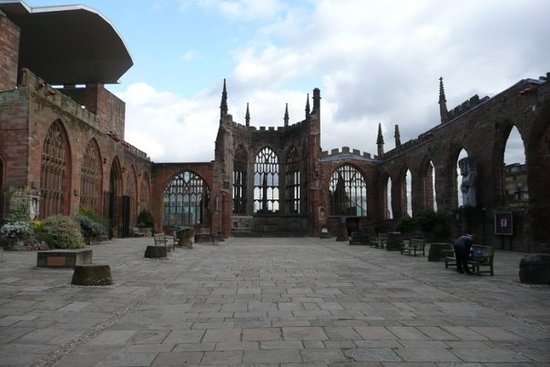
Coventry Cathedral remains an empty shell
Every building seemed to be on fire and in the distance flames were lighting up the cathedral. I was petrified and couldn’t move. A warden dragged me to the ground as the scream of another bomb came, but he left me to run to a woman who was on fire. He rolled her on the ground to put out the flames and took her to a shelter. I looked around to see if I could see any of the girls I had come with, but more bombs were falling and I needed somewhere to shelter. I heard another screaming bomb and threw myself behind a hedge and covered my ears against the bang. I don’t know how long I stayed – it seemed like hours. There were so many buildings burning that the firemen were helping people rather than trying to put them out. I knew that if I didn’t move soon I would die of cold. How I wished I had my old boots and breeches on instead of a dress and these silly shoes.
I tried to get to the station to get back to the Land Army base, but had no idea which way it was. When I finally saw the railway bridge I thought, ‘at last’, and then for the second time that night I was dragged to the ground, this time by a fireman who pointed to a land mine hanging like a chandelier from the bridge, its parachute caught.
I spent the rest of the night wet, cold and very frightened in a lady’s coal cellar underneath her house. There were several other occupants. One poor lady had completely lost her mind; she was screaming and trying to get out, saying that her son was somewhere in the city.
How I got back to base is still a mystery. I had a ride in a car, a tractor and the last transport I remember was a horse and cart.
Now when I see people in films or on TV falling out of windows with their clothes on fire I wonder how many like me remember that it really did happen during the Blitz.
It will stay with me for ever.
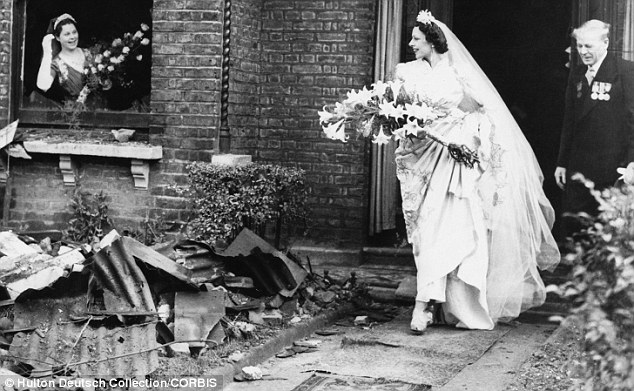
I won't let Adolf get me down: Dancer Ena Squire-Brown leaves her bombed home on the day of her wedding
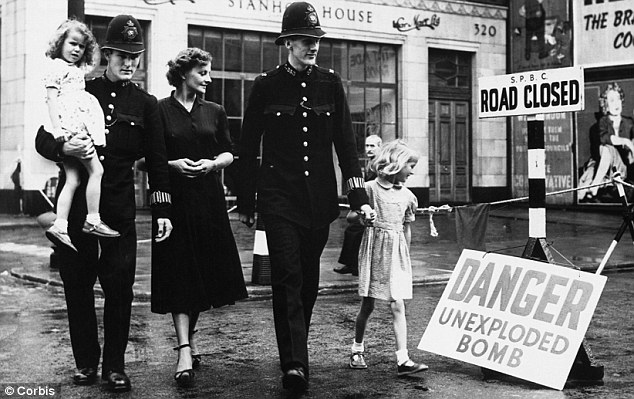
Police escort women and children past a bombsite
In late 1940, Claire Lowry applied to join the WRNS (Women’s Royal Naval Service). She went to their Portsmouth office after another night’s bombing.
People were streaming out of Portsmouth, with cases, bundles, prams and bicycles – all carrying as many belongings as they could muster. The reason was clear – terraces of houses, pubs, shops, were all in smoking ruins. The people had no homes any more, so they were on their way to the country. No doubt village halls and cottages would take them in and the WRVS [Women’s Royal Voluntary Service] would provide food and comfort as they always did in those times.
It was important to spot incendiary bombs quickly. The Fire Watchers Order, introduced in September 1940, compelled owners of businesses to ensure that someone on the premises was responsible for fire watching at all times – if you dealt with the fires quickly you could limit the damage. On 29 December 1940, incendiary bombs caused massive fires across the City of London. Reginald Bell was Group Coordinating Officer of the London Civil Defence Region.
At 6.30pm the attack began. Baskets and baskets of incendiaries clattered on the roofs and streets of the City of London. All around St Paul’s Cathedral fires sprang up and spread. Fire bombs fell on the cathedral roof but all were cast off and the cathedral was saved.
The water supply of London failed, important mains being shattered by high-explosive bombs. Only by dragging heavy suction pipes across the mud from the fire boats in the Thames could water be brought to the bank. In the river bed firemen toiled, coaxing slimy pipes into a battery of lines for vital water supply. Two officers and 14 men were killed. Across London 250 officers and men were injured in fighting the 1,500 fires that blazed that night.
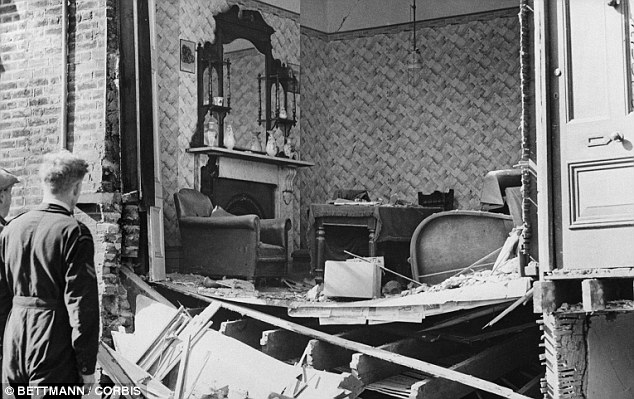
A man inspects the damage to his home
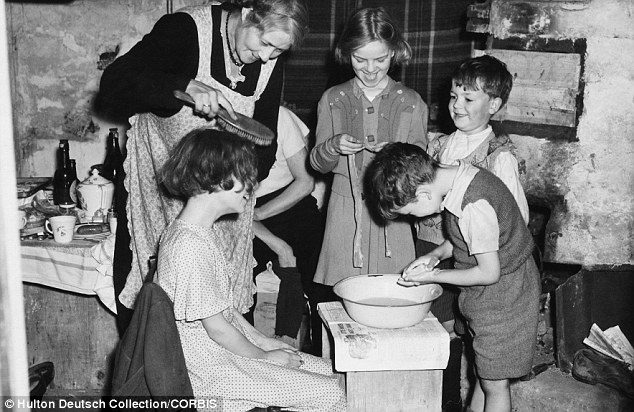
Still smiling: Children get ready to go to school after spending the night in an air-raid shelter
Teenager H W Atterbury had a lucky escape in 1944 when a bomb landed on his house in Islington, North London.
On a quiet Sunday morning after the warning had sounded a V1 [flying bomb] crashed at the corner of the street. My parents’ home was demolished with me underneath. I was still alive because my bedroom door had been blown inwards and had somehow fallen over the bed, resting on the top and bottom bed frames, creating a space which saved me from being crushed. I soon regained consciousness, choked with the soot and smoke, terrified by the noise, shouts and screams. My reaction was to struggle and shout until I noticed a chink of light to one side above me through which I eventually pushed my hand. This led to a frantic effort to get to me by some rescue workers and I was pulled out quite naked and bleeding from the numerous abrasions caused mostly by flying glass and scratches from jagged wood. I had a blanket put around me and was carried in the arms of a rescuer up and over the debris of my home. I saw my mother and father crying and in a state of shock, hardly believing that they could see and hear me again. After they had been assured that I was not seriously hurt we were led through the smoking rubble and past so many people tearing at and digging into the ruins of other houses, where people were still buried.
We were led to the underground station at Essex Road where there was some emergency help. Word was sent to my sisters who were living in Stoke Newington and we were soon collected by them. Over the next few weeks, I returned to dig in the debris of our home although there was little left to recover. But on one occasion two or three weeks later, when raising up the corner of our flattened kitchen table, I was startled when a filthy stinking lump of fur moved and I took into my hands our old pet cat, still alive. On the bus to Stoke Newington so many other passengers expressed sympathy for her, even in that filthy state. She lived with us for several years after.
V1s and V2s continued to cause havoc across the country until the final days of the war. After the last bomb landed in Hertfordshire in March 1945, Ann Maxtone Graham, who had been living in the relative safety of Market Harborough, Leicestershire, returned home to London.
The two houses directly behind us had been removed by a bomb. The whole window frame in the nursery bathroom had blown loose and hung down from the top but the glass was intact. We did a little painting and a little wall washing and then it began to look almost human. I can’t remember how I found a builder to do all the odd jobs, but it was a minor miracle, for everybody wanted someone to fix up their houses in any way possible. On the workman’s last day I came out of the kitchen with a broom in my hand to speak to the foreman who was getting ready to depart.
‘You know, I am not very happy about this ceiling,’ I said. ‘It looks a bit shaky to me.’
‘Shaky, madam? No, sound as a drum,’ and he took the broom out of my hands and gave it a good bang with the end of the handle, whereupon the whole thing came down on our heads.
This is an edited extract from Blitz Diary – Life Under Fire in the Second World War by Carol Harris, to be published by the History Press on 31 July at £9.99. To order a copy for £9.49 with free p&p, call 0845 155 0711, you-bookshop.co.uk
dailymail.co.uk
In August 1940, after much of Europe had been conquered by the Nazis and the British Empire stood alone against them, the Luftwaffe launched its devastating bombing campaign against British cities. From 24th August 1940 British cities were bombarded in a devastating wave of attacks. These attacks didn't last for several days or even several weeks - it wasn't until May 1941 that the bombings stopped. It wasn't just London that was hit. Almost every major town and city was. Birmingham, Manchester, Bolton, Coventry, Newcastle, Sunderland, Nottingham, Portsmouth, Cardiff, Swansea, Glasgow, Edinburgh, Belfast and more. London was so badly hit - it suffered 57 consecutive nights of bombing, leading to terror that can barely be conceived of today - that huge swathes of if were set ablaze, leading to the catastrophe being dubbed the Second Great Fire of London. By the end of the campaign Britain's cities were lying in ruins, around 43,000 civilians had been killed and 51,000 injured.
It took years for the cities to be rebuilt - many adults today who grew up in the 1950s can remember playing in bombed out buildings - and many buildings throughout the country still bear the scars of that devastating attack to this day.
At the start of the bombings, thousands of children (including my own grandparents) were evacuated from the towns and cities to live with strangers in the relatively safer countryside. Many went to live on farms. Many evacuees were also cruelly treated by their hosts. Many also told how, during the Blitz, they could see the night sky glowing orange in the distance as a city burned.
Hitler thought that such a campaign would eventually cause Britain to surrender and allow Germany to conquer it - but the British stood firm.
To mark the 70th anniversary of the start of the Blitz, these previously unpublished diaries, letters and memoirs, ordinary people describe what life was like during the Blitz.
Letters from the Blitz: Memoirs from the war's darkest days
By Carol Harris
17th July 2010
Daily Mail

Scars of war: Bomb damage from the Blitz is still visible to this day on buildings throughout the nation, such as that on the Victoria & Albert Museum in London (above)
Next month, it’s 70 years since the first German bombs of the Second World War fell on London. From 24 August 1940 Britain’s cities endured a long and terrible campaign of bombing that destroyed large parts of the country, killed thousands and left hundreds of thousands homeless. In this exclusive extract from previously unpublished diaries, letters and memoirs, ordinary people describe what life was like during the Blitz.

The Second Great Fire of London: St Paul's Cathedral remains standing as London burns all around
In London, attacks were concentrated on the City and the East End, the River Thames providing a shiny silver path for the bombers to follow to the docks. London suffered 57 consecutive nights of bombing from 7 September on, and during November had just one night’s respite, when bad weather prevented the Luftwaffe from coming.
This letter from Will, an ARP (Air-Raid Precautions) warden and schoolteacher in Leytonstone, East London to his brother in Wales describes the first weeks of the Blitz.
18 September 1940
I can’t possibly tell you of the number of bombs which have fallen, say, within one mile of this house. Stratford, Bow and Plaistow are terribly smashed up. Bombs fell on a number of shops in Leytonstone High Road and smashed four of them to mere rubble. Last Saturday night was the worst. An aerial torpedo landed directly on houses in Forest Drive West. Five were blown to pieces – not a stick of furniture could be seen – only piles of earth, bricks and beams of timber. Eleven bodies have been recovered and they think there are more to be found. Forty houses have been rendered uninhabitable and scores more in the street behind have had windows, doors, etc, destroyed.
I must confess that the long weary hours of waiting and listening through the night, quite alone in the house with not a soul to talk to, are very trying, but I am profoundly glad that Rube and the kiddies are away. This is no place for women and children.
Many folk have packed up and left here recently and I don’t blame them. Nearly all the main-line and suburban stations are closed. However, the biggest nuisance is the inability to shop, get a bath, haircut or go to church without being disturbed by the raids.

Tube stations were used as bomb shelters

A young girl clutches her doll while sitting amid the rubble of her bombed-out home
Elizabeth Belsey was living in the family home in Keston, Kent, while her husband, Lieutenant John Belsey, served with the Royal Artillery at Thames Ditton in Surrey. Here is an exchange of letters between them.
Sunday 8 September 1940
My darling girl,
It was terrible last night. We were up for nine hours and the sky was lit by the most lurid glow from the tremendous fires in London. I watched the flames and the planes and the guns and I thought of you and had a terrible feeling that you were in danger.
Please, my darling, do not get hurt. Please keep alive for me to come back to you, to love you and look after you and see my beautiful baby again. I am now living without sleep and I suppose you are too, and that is much worse. A peaceful night now seems too remote to be considered.
All my love, John
My darling boy,
You must not worry about me, sweetheart. We are all right. We had four warnings yesterday, but heard nothing. It is dreadful to think of what is happening in London.
You too must take care of yourself for me and our precious baby for I do not know how I could endure your loss. I pray that all or none of us survives this war.
With all my love, Elizabeth
From November 1940, the Luftwaffe extended its bombing campaign to industrial towns, cities and ports around the UK. Margaret Chifeny was a member of the Women’s Land Army, and here she recalls how on one of her days off she went to a dance in Coventry.

Coventry Cathedral remains an empty shell
Every building seemed to be on fire and in the distance flames were lighting up the cathedral. I was petrified and couldn’t move. A warden dragged me to the ground as the scream of another bomb came, but he left me to run to a woman who was on fire. He rolled her on the ground to put out the flames and took her to a shelter. I looked around to see if I could see any of the girls I had come with, but more bombs were falling and I needed somewhere to shelter. I heard another screaming bomb and threw myself behind a hedge and covered my ears against the bang. I don’t know how long I stayed – it seemed like hours. There were so many buildings burning that the firemen were helping people rather than trying to put them out. I knew that if I didn’t move soon I would die of cold. How I wished I had my old boots and breeches on instead of a dress and these silly shoes.
I tried to get to the station to get back to the Land Army base, but had no idea which way it was. When I finally saw the railway bridge I thought, ‘at last’, and then for the second time that night I was dragged to the ground, this time by a fireman who pointed to a land mine hanging like a chandelier from the bridge, its parachute caught.
I spent the rest of the night wet, cold and very frightened in a lady’s coal cellar underneath her house. There were several other occupants. One poor lady had completely lost her mind; she was screaming and trying to get out, saying that her son was somewhere in the city.
How I got back to base is still a mystery. I had a ride in a car, a tractor and the last transport I remember was a horse and cart.
Now when I see people in films or on TV falling out of windows with their clothes on fire I wonder how many like me remember that it really did happen during the Blitz.
It will stay with me for ever.

I won't let Adolf get me down: Dancer Ena Squire-Brown leaves her bombed home on the day of her wedding

Police escort women and children past a bombsite
In late 1940, Claire Lowry applied to join the WRNS (Women’s Royal Naval Service). She went to their Portsmouth office after another night’s bombing.
People were streaming out of Portsmouth, with cases, bundles, prams and bicycles – all carrying as many belongings as they could muster. The reason was clear – terraces of houses, pubs, shops, were all in smoking ruins. The people had no homes any more, so they were on their way to the country. No doubt village halls and cottages would take them in and the WRVS [Women’s Royal Voluntary Service] would provide food and comfort as they always did in those times.
It was important to spot incendiary bombs quickly. The Fire Watchers Order, introduced in September 1940, compelled owners of businesses to ensure that someone on the premises was responsible for fire watching at all times – if you dealt with the fires quickly you could limit the damage. On 29 December 1940, incendiary bombs caused massive fires across the City of London. Reginald Bell was Group Coordinating Officer of the London Civil Defence Region.
At 6.30pm the attack began. Baskets and baskets of incendiaries clattered on the roofs and streets of the City of London. All around St Paul’s Cathedral fires sprang up and spread. Fire bombs fell on the cathedral roof but all were cast off and the cathedral was saved.
The water supply of London failed, important mains being shattered by high-explosive bombs. Only by dragging heavy suction pipes across the mud from the fire boats in the Thames could water be brought to the bank. In the river bed firemen toiled, coaxing slimy pipes into a battery of lines for vital water supply. Two officers and 14 men were killed. Across London 250 officers and men were injured in fighting the 1,500 fires that blazed that night.

A man inspects the damage to his home

Still smiling: Children get ready to go to school after spending the night in an air-raid shelter
Teenager H W Atterbury had a lucky escape in 1944 when a bomb landed on his house in Islington, North London.
On a quiet Sunday morning after the warning had sounded a V1 [flying bomb] crashed at the corner of the street. My parents’ home was demolished with me underneath. I was still alive because my bedroom door had been blown inwards and had somehow fallen over the bed, resting on the top and bottom bed frames, creating a space which saved me from being crushed. I soon regained consciousness, choked with the soot and smoke, terrified by the noise, shouts and screams. My reaction was to struggle and shout until I noticed a chink of light to one side above me through which I eventually pushed my hand. This led to a frantic effort to get to me by some rescue workers and I was pulled out quite naked and bleeding from the numerous abrasions caused mostly by flying glass and scratches from jagged wood. I had a blanket put around me and was carried in the arms of a rescuer up and over the debris of my home. I saw my mother and father crying and in a state of shock, hardly believing that they could see and hear me again. After they had been assured that I was not seriously hurt we were led through the smoking rubble and past so many people tearing at and digging into the ruins of other houses, where people were still buried.
We were led to the underground station at Essex Road where there was some emergency help. Word was sent to my sisters who were living in Stoke Newington and we were soon collected by them. Over the next few weeks, I returned to dig in the debris of our home although there was little left to recover. But on one occasion two or three weeks later, when raising up the corner of our flattened kitchen table, I was startled when a filthy stinking lump of fur moved and I took into my hands our old pet cat, still alive. On the bus to Stoke Newington so many other passengers expressed sympathy for her, even in that filthy state. She lived with us for several years after.
V1s and V2s continued to cause havoc across the country until the final days of the war. After the last bomb landed in Hertfordshire in March 1945, Ann Maxtone Graham, who had been living in the relative safety of Market Harborough, Leicestershire, returned home to London.
The two houses directly behind us had been removed by a bomb. The whole window frame in the nursery bathroom had blown loose and hung down from the top but the glass was intact. We did a little painting and a little wall washing and then it began to look almost human. I can’t remember how I found a builder to do all the odd jobs, but it was a minor miracle, for everybody wanted someone to fix up their houses in any way possible. On the workman’s last day I came out of the kitchen with a broom in my hand to speak to the foreman who was getting ready to depart.
‘You know, I am not very happy about this ceiling,’ I said. ‘It looks a bit shaky to me.’
‘Shaky, madam? No, sound as a drum,’ and he took the broom out of my hands and gave it a good bang with the end of the handle, whereupon the whole thing came down on our heads.
This is an edited extract from Blitz Diary – Life Under Fire in the Second World War by Carol Harris, to be published by the History Press on 31 July at £9.99. To order a copy for £9.49 with free p&p, call 0845 155 0711, you-bookshop.co.uk
dailymail.co.uk
Last edited: